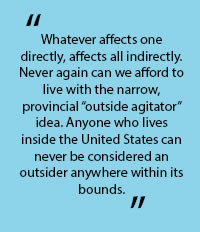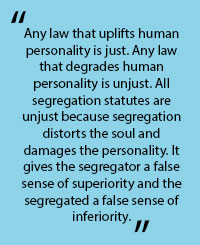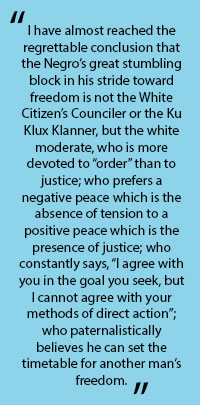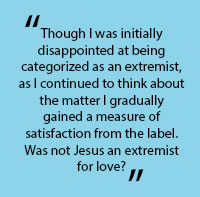Martin Luther King Jr. Day
The Birth of a Man
 I was in the fourth grade. By virtue of math, I know I was 9 years old, almost a month from my 10th birthday. My life's timeline is a locale line because my dad was an Air Force chaplain and we moved every 2 1/2 years; thus, it's the place that dates this story: a small ranch house on Davis-Monthan Air Force Base in Tucson, Arizona. It must have been early evening, probably before dinner. In fact, I might have been wondering when we would be eating as I came out of my bedroom and walked down the hallway to the living room to find my distraught parents watching the television. Mom was crying; Dad was pained.
I was in the fourth grade. By virtue of math, I know I was 9 years old, almost a month from my 10th birthday. My life's timeline is a locale line because my dad was an Air Force chaplain and we moved every 2 1/2 years; thus, it's the place that dates this story: a small ranch house on Davis-Monthan Air Force Base in Tucson, Arizona. It must have been early evening, probably before dinner. In fact, I might have been wondering when we would be eating as I came out of my bedroom and walked down the hallway to the living room to find my distraught parents watching the television. Mom was crying; Dad was pained.
“What happened?” I asked.
“Martin Luther King was shot,” my mom said.
I'm pretty sure, being that I was 9, my next question would have been: “Was he killed?” He was. Then came the key question: “Who is Martin Luther King?”
The rest of my recollection of that night, as significant as the events would be for the rest of my life, is murky. The clearest thing I remember is that my mom, trying to answer my question, included the detail that Dr. King had been in jail several times. To me this could mean only one thing: he was a criminal, so why are you guys so upset? A white 9-year-old in a military family circa 1968 couldn't fully fathom the notion of civil disobedience, and my mom tried to dispel my misunderstanding.
Apparently still confused, I did what we always resorted to in those days when we needed facts: I went to our set of encyclopedia, pulled out the K volume, and looked up King, Martin Luther. Our encyclopedia would have been fairly new in 1968 (we moved to Tucson from Ankara, Turkey, two years before) and I recall that it had a pretty-good-sized write-up on Dr. King. What I did next, however, baffles me to this day: I hand-wrote a two-page report on Dr. King that I intended to read to my fourth-grade class the next day. You could say this was an early seed in my destiny to become a journalist, but that was the only time I did such a thing in my entire school life. At the least, I must have been deeply moved by my parents' distress, but some of you will see the hand of the Holy Spirit or God here.
 The next morning I gave my report to my teacher, Mr. Stultz, and told him I wanted to read it to the class. He read it silently, then said thank you and that while it wasn't appropriate for me to read it, he agreed that he should address the assassination of Dr. King with the class. The word appropriate is mine in retrospect: I don't remember how exactly he put it, but I'm guessing what I wrote was not appropriate as I probably focused over-much on the fact that Dr. King went to jail several times. As that day's class got underway, Mr. Stultz started off by referring to the fact that I had given him this report, and then he talked to the class about Dr. King and his assassination for several minutes. I don't remember what he said, but I do remember that Mr. Stultz spoke with genuine feeling for Dr. King and concern over the assassination (Mr. Stultz was himself a retired Air Force officer, a B-17 navigator in World War II and a special investigation agent in the 1950s; his graphic descriptions, complete with photographs, of the effects of drug abuse are the reason I never ever did drugs).
The next morning I gave my report to my teacher, Mr. Stultz, and told him I wanted to read it to the class. He read it silently, then said thank you and that while it wasn't appropriate for me to read it, he agreed that he should address the assassination of Dr. King with the class. The word appropriate is mine in retrospect: I don't remember how exactly he put it, but I'm guessing what I wrote was not appropriate as I probably focused over-much on the fact that Dr. King went to jail several times. As that day's class got underway, Mr. Stultz started off by referring to the fact that I had given him this report, and then he talked to the class about Dr. King and his assassination for several minutes. I don't remember what he said, but I do remember that Mr. Stultz spoke with genuine feeling for Dr. King and concern over the assassination (Mr. Stultz was himself a retired Air Force officer, a B-17 navigator in World War II and a special investigation agent in the 1950s; his graphic descriptions, complete with photographs, of the effects of drug abuse are the reason I never ever did drugs).
It would take me years to fully understand my parents' reactions to Dr. King's assassination. In fact, I didn't fully understand the full magnitude until less than a year ago. Though a North Carolina native, I grew up on fully integrated U.S. Air Force bases—none in the Old South—so I rarely if ever saw racism in action. I remember how shocked I was in high school to hear the racist remarks of family members a generation previous to my parents (in fact, after I graduated from high school and was staying with a great aunt and uncle in my parents' hometown, the aunt warned me not to mention to my great uncle that my girlfriend was Catholic lest he kick me out of their house).
 Over the years I began hearing of my father's activist ways, not only while he was in the Air Force but during his first calling as an associate pastor in an eastern North Carolina Southern Baptist church before entering the military. He would have been in his late 20s. His greatest sin was putting the title “Mr.” before the name of the church custodian in the Sunday service bulletin. One family legend suggests Dad faced down the Ku Klux Klan, though I never heard him say this; what he did say was that he took heat from the deacons and some in the congregation, and he answered with what I always thought was a classic comeback: The custodian, Dad pointed out, “is in his 60s, so he's not a boy, he's not my son, and he's not my uncle. Furthermore, I was always taught to call anybody older than me with respect, as ‘Mr.'” At my father's funeral last March, the minister who gave the eulogy had been a young boy in that church when Mom and Dad were there, and he revealed in his eulogy that Dad had actually goaded the congregation with this act, inspired as he was by the teachings of Martin Luther King Jr. I realized that on that evening of April 4, 1968, I only recollect Mom talking to me; Dad must have been in a world of hurt.
Over the years I began hearing of my father's activist ways, not only while he was in the Air Force but during his first calling as an associate pastor in an eastern North Carolina Southern Baptist church before entering the military. He would have been in his late 20s. His greatest sin was putting the title “Mr.” before the name of the church custodian in the Sunday service bulletin. One family legend suggests Dad faced down the Ku Klux Klan, though I never heard him say this; what he did say was that he took heat from the deacons and some in the congregation, and he answered with what I always thought was a classic comeback: The custodian, Dad pointed out, “is in his 60s, so he's not a boy, he's not my son, and he's not my uncle. Furthermore, I was always taught to call anybody older than me with respect, as ‘Mr.'” At my father's funeral last March, the minister who gave the eulogy had been a young boy in that church when Mom and Dad were there, and he revealed in his eulogy that Dad had actually goaded the congregation with this act, inspired as he was by the teachings of Martin Luther King Jr. I realized that on that evening of April 4, 1968, I only recollect Mom talking to me; Dad must have been in a world of hurt.
That night, though, was the true beginning of me. Because of Mr. Stultz's address to the class, inspired by my “report,” I was soon in both the school and base libraries checking out every book on and by Martin Luther King I could find. I even bought a biography on him by the time I was in junior high school (I had it with me when we lived in Fairbanks, Alaska, our next posting after Tucson). Today, our home's library includes the three-volume series of Taylor Branch's America in the King Years, and I have the complete set of the King Papers.
Martin Luther King Jr. for me is more than words and clips of speeches. The five people who made me me are, in order, my parents, Dr. King, Jesus Christ, and my wife. Dr. King is part of my soul's DNA, as his life and his teachings shaped my worldview. If not for Martin Luther King Jr., I would not appreciate William Shakespeare's works the way I do. We have a huge library in our home (actually four libraries, including separate collections for theater, baseball, and cookbooks), but while all the rest are inspirational, only three books serve as my spiritual anchors: the Bible (specifically, the four chapters of the Gospel—unlike too many Christians, I not only don't skip over the pages between Leviticus and Paul's letters, I consider the words of Jesus to be  the real universal truths), Shakespeare's Complete Works, and Martin Luther King Jr.'s Letter from Birmingham Jail (printed in full in his book Why We Can't Wait).
the real universal truths), Shakespeare's Complete Works, and Martin Luther King Jr.'s Letter from Birmingham Jail (printed in full in his book Why We Can't Wait).
“I have a dream,” as famous and inspirational a speech as ever delivered, is a prayer or a wish—a dream (and, in fact, it was off-the-cuff as Dr. King got bogged down in his original speech and ad-libbed his way out of a rhetorical mire). Letter from Birmingham Jail is a doctrine for action and a Christian epistle for the causes of enfranchisement and equal rights for all people. In April 1963, King had been jailed in the wake of one of his marches in Birmingham, Alabama, and he read a newspaper account in which several white Alabama clergymen, though voicing support for civil rights for Black Americans, worried that Dr. King's activism was counterproductive. They preached patience. Dr. King began writing his response in the margins of the newspaper and kept going in the margins of each newspaper delivered to him in the jail. Inspiration flowed through him as he laid out the reasons for his activist strategies and “why we can't wait.” He also established the logic of enfranchisement in the health of the entire community, nation, and the world. “Injustice anywhere is a threat to justice everywhere,” he wrote. All of the quotes I've highlighted on this page come from that Letter from Birmingham Jail.
No wonder Mom's reference to Martin Luther King having been in jail was spoken with such apparent resonance that it struck me so.
Today's holiday celebrating Martin Luther King Jr.'s birth has become a day that the nation dedicates to public service. As noble as that cause is, my wife and I never held it so for purely selfish reasons. In a marriage between a journalist and a member of the military, not only are we performing public service every day (when my wife was on active duty it was 365/24/7), three-day weekends are rare respites from hectic days, if only for the infrequent chance to clean the house (or, for this particular holiday, finally putting away the Christmas decorations). However, with the current state of national and global affairs and the increasing frequency of racial- and ethnic-based turbulence, I've decided this year to honor this day of service, this day celebrating the spirit of Martin Luther King Jr. as well as his life.
My service (among other ongoing journalistic duties) has become Shakespeareances.com. It was conceived as a vanity project, and friends saw much commercial potential in the idea. However, it has become a community service mission. It is intended to provide Shakespeare fans another roadmap to enjoying and enhancing their appreciation of the Bard's works. It is intended to serve as my personal introduction to Shakespeare for those new to the Bard. It is intended to shed an international spotlight on the many theater companies, festivals, and artists who bring Shakespeare's works to life. There's a lot to learn from Shakespeare; there's a lot to learn from Martin Luther King Jr.; today, I'm adding my efforts to theirs.
It may be a miniscule thing in the grand scheme of this great globe, but I believe that justice anywhere is a step to eroding injustice everywhere.
Eric Minton
Jaunary 16, 2017

Comment: e-mail editorial@shakespeareances.com
Start a discussion in the Bardroom



 Find additional Shakespeareances
Find additional Shakespeareances